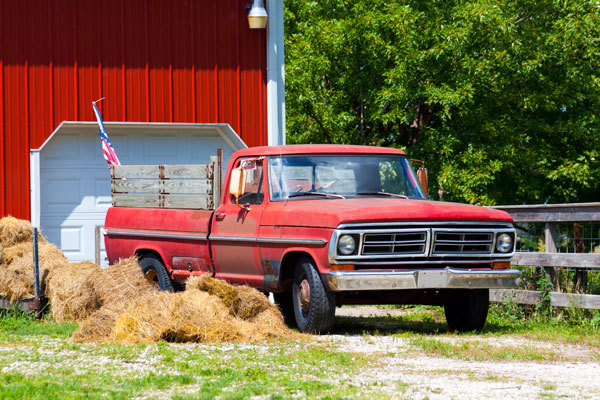
Luckily these days, the horsepower we need to get jobs done on the farm can be provided by the turn of a key on an internal combustion engine rather than hitching up a team of horses. A well-equipped truck is an indispensable tool that makes your jobs on the farm easier and more efficiently accomplished. But with so many choices of trucks to consider, how do you narrow down what applies to your needs?
Fine-Tuning Your Search
First, consider what jobs you need for the truck to do. Is it meant to only move hay or do you need it to pull implements and/or a loaded horse trailer, as well? Does it need to be a transportation vehicle for the family in addition to doing work on the farm?
These basic questions will fine-tune your search. Remember that it’s always best to buy a “little more truck” than you think you need than to buy a vehicle and later wish it came with more options on it or more towing power (or stopping power). Many upgrades aren’t available, and those that are might be expensive.
Before diving into the truck quest, narrow down the specifics as to what you are looking for:
- Do you need a ½ ton, ¾ ton, or 1-ton payload?
- Do you need the truck to have 4-wheel drive?
- Do you have a preference for a manual or automatic transmission?
- Do you have a preference for a gas or a diesel engine?
- How much horsepower do you need to get the jobs done? Do you need a 4-cylinder, 6-cylinder, or V8 engine? More horsepower often translates to less fuel economy, but for heavy-duty jobs, it’ll be necessary to sacrifice mileage for power and torque.
- What kind of rear end gearing should the drive axle have? For example, do you prefer a 410 for heavy hauling or a 373 that is geared more to road use?
- Do you need larger interior space than a regular cab for accommodating additional passengers (two- or four-legged)?
- Can you get by with a short bed (6 feet) or do you need a long bed (8 feet) for hauling lumber, building supplies, equipment and hay?
- Do you need the truck to have a towing package for hauling a horse trailer or implements?
- Will you only use it on your property or does it need to be road worthy and licensed/insured for use as part of your regular transportation?
- What is your budget? Would you be happy with an older vehicle that needs some work periodically or do you want a newer, more reliable vehicle? Consider the costs of insurance, registration and licensing fees, and taxes on a new vehicle as compared to those same costs for an older truck. If you need to finance the truck, also factor in interest fees from the bank.
- If looking at a used truck, what’s the top odometer mileage you’d accept?
- Is good fuel mileage important to you or would you be satisfied with the right truck no matter the gas mileage it get?
- What kind of additional frills do you want? Air conditioning? Fancy sound system? Electronic locks? Electric and/or heated seats? Leather upholstery? A specific color? Trim package? All these add-ons add onto the price you’ll pay.
How to Go About the Truck Search
Besides classified ads and local farm and equipment/vehicle magazines, the Internet is a powerful tool to use for vehicle search and research. Consumer Reports (http://consumerreports.org ) and U.S. News and World Report (http://usnews.rankingsandreviews.com/cars-trucks/rankings/trucks/) also give comparisons of different makes and models of vehicles.
Try to do your homework in advance of going to look at a vehicle. Dealerships often have used trucks they’ve taken as trade-in and this can give you an opportunity to try out a vehicle to see if you’re on the right track. You might find what you’re looking for and with an added bonus since dealerships often offer warranties on used vehicles for an additional cost.
If you aren’t a particularly mechanically minded person, bring along a friend who is. There’s more to checking out a truck than just kicking the tires. It’s important to test drive the vehicle to see how it feels in your hands, but just as important is to have someone along who can listen to the motor and look under the chassis to identify glaring and perhaps more subtle problems.
If you decide on a used truck, research its CarFax that gives you detailed history on the vehicle, including maintenance and accident reports. Ask the seller for all the maintenance records and receipts for routine maintenance and repairs. You often can’t tell by looking if the vehicle was in a flood or wrecked and repaired.
Once the truck passes your total review, then it is money well spent to take it to your mechanic to have him do a thorough inspection before you buy. This lets you know about current and potential problems and what kinds of repairs you might anticipate. This pre-purchase inspection can save you a lot of headaches and expense down the road.
Showing Off Your Truck
If you are diligent about formulating the specifics of what you need in a farm truck, then you’ll have an enjoyable time during the shopping process that leads you to the right truck to buy. There’s something about the American culture that empowers us when we sit behind the wheel of our vehicles, no matter whether it is used or shiny new. Keep looking until you find the right truck that satisfies your farm needs and makes you proud to spend time behind the wheel. Happy hunting!


